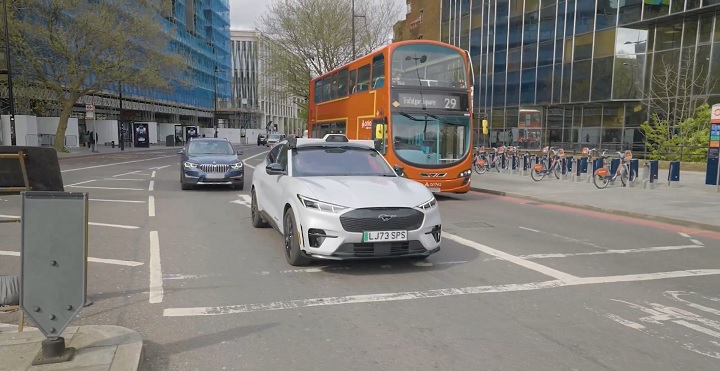
Image: DfT
From spring 2026, self-driving cars without a safety driver could be available for people to book via an app for the first time, the Government has announced.
Under the plans, announced during London Tech Week, pilots of self-driving taxi and bus-like services will be brought forward by a year.
This comes before a potential wider rollout when the full Automated Vehicles Act becomes law from the second half of 2027.
The DfT says road safety will be at the forefront of the pilots, with self-driving vehicles aiming to reduce human error – which contributes to 88% of all road collisions.
Heidi Alexander, transport secretary, said: “The future of transport is arriving. Self-driving cars could bring jobs, investment, and the opportunity for the UK to be among the world-leaders in new technology.
“With road safety at the heart of our pilots and legislation, we continue to take bold steps to create jobs, back British industry, and drive innovation to deliver our Plan for Change.”
The Automated Vehicles Act will require self-driving vehicles to achieve a level of safety at least as high as competent and careful human drivers, and they will undergo rigorous safety tests before being allowed on our roads.
By having faster reaction times than humans, and by being trained on large numbers of driving scenarios, including learning from real-world incidents, the DfT says self-driving vehicles can help reduce deaths and injuries.
Peter Kyle, technology secretary, said: “We can’t afford to take a back seat on AI, unless it’s on a self-driving bus. It’s great to see the UK storming ahead as a global leader in using this technology – making our roads safer, travel easier and driving growth by spurring innovation across the country.
“That’s why we’re bringing timelines forward today, placing the UK firmly in the fast lane and creating opportunity along the way so people across the country benefit.”
In response to Jay’s question, the autonomous vehicle will stop in time without having to swerve..that at least is one of the advantages over human drivers not paying attention to what’s going on in front. My original concern still stands however. For example, if we, as humans see blue lights and hear sirens behind us, we think about stopping or pulling over as required…would an autonomous vehicle ‘know ‘ to do this or would it carry on regardless? Have its programmers thought of every conceivable situation on our roads that we as humans have to deal with?
Hugh Jones, South Wirral
--1
An AI car suddenly has to avoid a collision with the car in front, but what option does it choose? If it swerves to the left to avoid the collision it will hit a cyclist, if it swerves to the right it will hit a motorbike rider, if it hits the car in front it will injure the passenger inside?
Jay Furniss, Sheffield
0
There is an interesting perspective from Adam Tranter here https://www.theguardian.com/commentisfree/2025/jun/12/driverless-cars-pedestrians-second-class-citizens
“The car made pedestrians second-class citizens. Don’t let driverless vehicles push us off the road altogether”
Rod King, Lymm
0
Self-driving cars are only going to be as good as those who have ‘programmed’ them to drive safely…so do these programmers themselves have a proven perfect safety record as far as their own day-to-day driving is concerned?…just to put us at our ease.
Hugh Jones, South Wirral
0